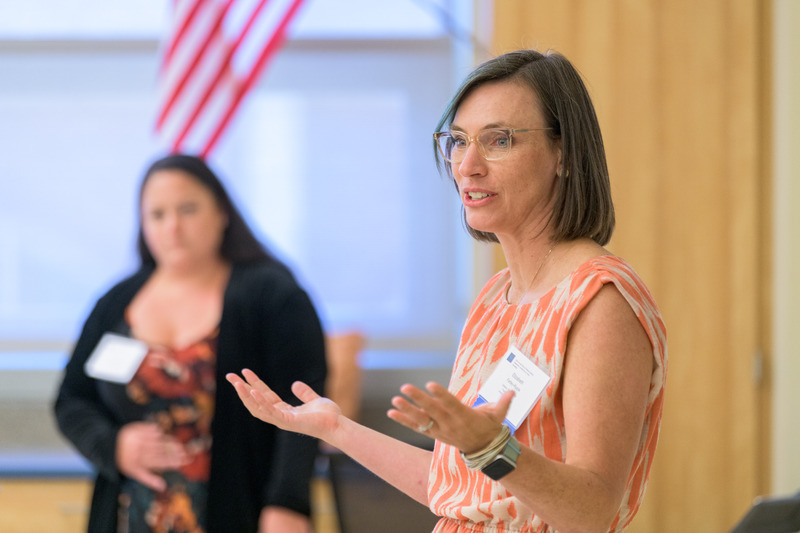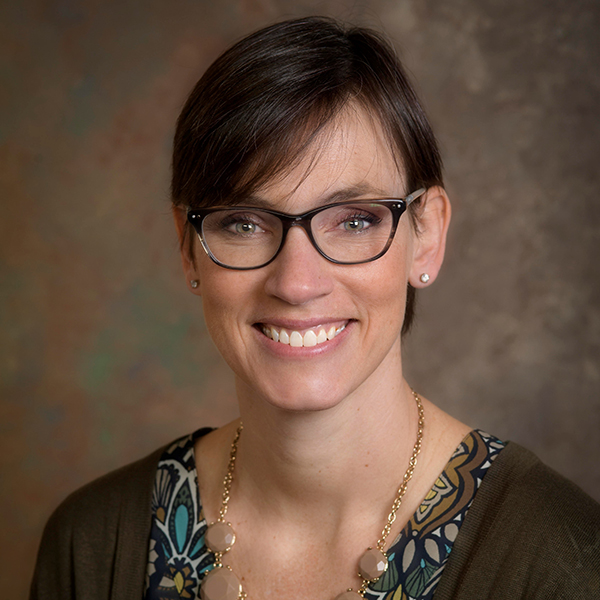Research Spotlight: Elizabeth Farley-Ripple

New research from Professor Elizabeth Farley-Ripple shows how education doctorate programs can support school leaders in research use
School leaders—like assistant principals, principals and superintendents—often determine how educational research is used in planning, decision-making and implementing initiatives that improve students’ academic or developmental outcomes. Yet, not all education doctorate (Ed.D.) programs—which lead to the highest attainable degree for school leaders—focus on understanding and using research to examine practical problems and identify solutions in their schools or districts.
In a recent paper, University of Delaware Professor Elizabeth Farley-Ripple and her colleagues offer a new model for designing Ed.D. programs so that they can improve school leaders’ use of research evidence (URE). Borrowing a framework from behavioral psychology, Farley-Ripple and colleagues show how Ed.D. programs can target school leaders’ capabilities, motivations and behaviors to better facilitate their research use. She also outlines specific programmatic features of Ed.D. programs that work toward this goal—features included in UD’s newly redesigned Ed.D. in Organizational Improvement for Educational Leaders.
“Leadership is a critical component of building educators, schools’ and the system’s capacity to use research evidence for improvement—and Ed.D. programs can be a critical lever for developing research use-related skills and knowledge leaders need to drive that kind of change,” said Farley-Ripple, who specializes in educators’ evidence use and knowledge mobilization in the College of Education and Human Development’s (CEHD) School of Education (SOE).
Building capacity, opportunity and motivation
Farley-Ripple and her colleagues connect ideas from behavioral psychology to educators’ URE through the Capabilities–Opportunity–Motivation Framework for Behavioral Change. This framework posits that a behavior—in this case, URE in pre-K-12 settings—results from the interaction of three components: 1) capability, the educator’s psychological and physical capacity to engage in URE; 2) opportunity, external factors that enable URE; and 3) motivation, internal processes that energize and guide URE, such as beliefs, emotions, goals and intentions.
Farley-Ripple and her colleagues argue that the most effective Ed.D. programs—what she calls “redesigned Ed.D. programs”—build educators’ capacity for research use through coursework on accessing, understanding and disseminating research, as well as educational leadership and organizational improvement.
Crucially, redesigned Ed.D. programs also build capacity through their dissertation process. Farley-Ripple and her colleagues recommend a program that allows educators to focus on a “problem of practice” or a persistent and complex issue in their current pre-K-12 school context. Students learn to address this problem of practice by applying research methods from their coursework, conducting needs assessments, testing interventions and evaluating outcomes.
The program then culminates in a dissertation-in-practice that documents their application of theory and research.
“Focusing on a problem of practice—such as reducing chronic absenteeism, helping teachers to more effectively use early literacy screeners or building a culture of belonging—in a leader’s own context helps make much more meaningful connections between theoretical ideas and the actual work of schools,” Farley-Ripple said. “It also gives leaders an opportunity to see the impact their work has—all of which contributes to motivation and confidence in their ability to use research.”
Finally, redesigned Ed.D. programs can increase the opportunity for URE by adopting a cohort model, where students progress through the program together. In addition to fostering belonging, cohorts also teach educators how to increase the opportunities for URE in their schools. For example, through group assignments and cohort interactions, school leaders explore how to lead collaborative inquiry, promote evidence-informed practices and create systems for sharing knowledge within their workplaces.
“These are not just technical skills about reading or doing research, but also strategic leadership skills that help shift organizational routines and cultures that can help improvement efforts be more research-informed,” Farley-Ripple said.
UD’s redesigned Ed.D. program
Launched in September 2025, UD’s redesigned Ed.D. program applies many of the features highlighted in Farley-Ripple’s work, including a dissertation-in-practice and a cohort approach.
“UD’s redesigned program is oriented toward organizational leaders in education and beyond,” said Lauren Bailes, associate professor in the SOE. “We have students from nursing, communications, law and, of course, pre-K-12 and higher education. Its new design positions leaders to be able to diagnose, intervene and assess a broad range of organizational challenges through the problem of practice and dissertation-in-practice models.”
In addition to the cohort model, the redesigned program also implements a cohort advising strategy, a collaborative approach in which a team of faculty members advise the same group of students from beginning to end.
The program also includes coursework changes, introducing topics related to organizational improvement like adult learning theories and principles, designing and implementing professional development, creating and using teams and understanding systems that influence improvement efforts.
“Alongside our three-credit courses, we also instituted a series of one-credit colloquia-like courses that cover topics related to research use, community engagement, advocacy and building coalitions in order to facilitate systems-wide change,” said Bryan VanGronigen, associate professor and Ed.D. program coordinator in the SOE. “All of our coursework topics reflect recent research recommendations on the leader’s knowledge, skills and dispositions needed for improving organizations.”
The program also creates an environment where adult learners thrive, with students already reporting that the program creates a collegial and supportive environment.
To learn more about CEHD research on education leadership and administration, visit its research page.
Article by Jessica Henderson. Photo by Evan Krape.
About Elizabeth Farley-Ripple
Elizabeth N. Farley-Ripple is a professor and senior associate director in the School of Education, co-directs the Center for Research Use in Education and is director of the Partnership for Public Education. Her research focuses on educators’ use of research and data, the role of leadership in evidence-informed improvement, systems and structures that support knowledge mobilization across the educational ecosystem and improving and professionalizing the role of knowledge brokers.
This research complements the work of CEHD faculty studying education leadership and administration, including Lauren Bailes, James Bridgeforth, Joy Esboldt, Lynsey Gibbons, Jarett D. Haley, Gary T. Henry, Beth Mineo and Bryan VanGronigen.




